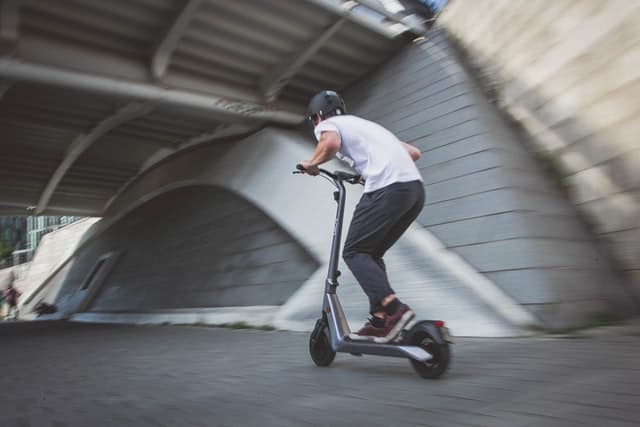For colleges and universities making micromobility available on their campuses, electric scooter safety is crucial. The challenges universities have faced with this are fairly well-documented, and e-scooter operators certainly have their own responsibilities when it comes to ensuring campus safety during micromobility program rollouts. But thankfully, there are some straightforward ways campus administrators and program managers can help encourage and ensure the safest experience possible for students.
As campuses all over the country begin to shape their own unique programs, they must build in layers of student safety, education and easy-to-understand parameters for behavior. With proper communication, high-quality marketing of the simple electric scooter safety tips and a cohesive campaign to get all student riders on board to maintain these safety practices, campuses can roll out an impactful, safe electric scooter program.
What electric scooter safety factors should colleges address?
Mitigating the most common electric scooter safety issues on campuses is the immediate imperative for launching a holistic safety program for campus micromobility. These include – but are certainly not limited to:
- Providing riders a comprehensive education before their first ride
- Discouraging speeding and educating riders on maintaining proper speed
- Promoting that riders wear a helmet every time, every ride, no matter how short a ride
- Discouraging any amount of drinking alcohol before operating an electric scooter
- Encouraging overall spatial awareness and safety practices while scooting
- Encouraging safe and considerate parking practices
And electric scooter safety education is just as important for operators as for the campuses where they launch programs – ensuring student well-being and high adoption of programs.
“We’ve seen tremendous adoption of e-scooters across dozens of campus programs,” said John Lankford, head of campus partnerships with Spin. “Beginning in 2021, we have our own paid student safety ambassadors on campuses, encouraging safe riding practices and increased utilization of e-scooters amongst cohorts. Along with Spin’s free helmet program, these students are part of the important work to encourage riding safely, parking orderly and wearing helmets.”
Five electric scooter safety tips for students
1. Rider education is a prerequisite.
Rider education is one of the most important investments college campuses will make in student safety, with the majority of accidents involving injuries occurring in the first seven rides. By requiring a certain minimum education completion before the very first use, campuses can help ensure a solid foundation of knowledge for all riders.
2. Maintain safe electric scooter speeds.
By now, it’s well-documented that a safe speed for most electric scooters on campus is somewhere around 15 miles per hour – and often even lower than that in certain areas of campus. So it’s vital that campus programs promote electric scooter safety tips like those around speed, with comprehensive education about the dangers of excessive speed while operating an e-scooter, as well as high-quality signage on campus. Beyond that, some campuses are using high-tech tools like geofencing to control scooter speeds or travel distances, in much the same way that many corporate fleet vehicles are managed. Likewise, many campuses have instituted “no-ride” zones, as well, offering additional routes to management of traffic and overall student safety.
3. Always, always, always wear a helmet.
In a study of injured patients who had accidents involving e-scooters or other micromobility devices, two-thirds had no helmet on at the time of the incident (despite some recording helmet usage). For this and many other reasons, the evidence is clear: Wearing a helmet while operating scooters on campus is a non-negotiable requirement. Campuses should feel empowered and know they are backed by evidence when they examine or institute zero-tolerance policies around helmet wearing. Penalties should include fines and other consequences to deter unsafe behaviors.
4. Like Cars, Like Scooters: There should be no drinking and riding
While many operators have added app-based check-ins and other elements to deter drinking and riding on electric scooters, campuses can also have a hand in squashing these kinds of reckless behaviors. This could include “no-ride” hours, working with campus and local police to establish enforceable laws or rules around drinking, and mounting a focused educational push or awareness campaign against drinking and riding on-campus e-scooters.
5. Practice good common sense.
There are, of course, other factors that all add up to more than just a high-quality riding experience for students, but ultimately an overall safer environment for the entire campus. Spatial awareness at all times is paramount for rider safety, as well as responsible parking of scooters (to minimize trip hazards and clutter). Riders should be reminded to always wear light-colored or highly visible clothing (i.e., reflectors), particularly when driving at night or in dark conditions, and riders should be made aware that using scooters during inclement weather is risky and should be avoided (lightning storms, for example).
For more electric scooter safety tips, statistical resources, messaging and other elements that will help campus administrators build an effective micromobility campaign, rely on Scoot Safe and scoot on over to our Resources section. Every campus has to start somewhere when it comes to micromobility. Campus administrators looking to start their unique program can feel good about using the proven best practices of other successful programs, with Scoot Safe providing helpful guidance.


